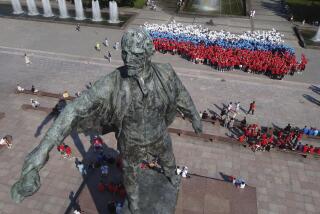Come the Revolution, All Bets Are Off in Soviet Union : Soviets: Even if the Communists leave power, the nation has much more in common with the ‘have-nots’ than the ‘haves’ of the world.
- Share via
NEW ORLEANS — “I cannot forecast to you the action of Russia. It is a riddle wrapped in a mystery inside an enigma.”
That is what Winston Churchill said shortly after Joseph Stalin and Adolf Hitler signed their nonaggression pact in 1939. More than 50 years later, the eyes of the world remain glued to the unpredictable power struggles and policy twists in this great and ancient empire.
Recent months have seen an acceleration in the pace of developments in the Soviet Union. The nation hovered on the brink of civil war in the Baltic states and in the Caucasus; grim and cold-eyed hard-line Communists seemed to seize the political initiative; Gorbachev seemed weak and indecisive, and Boris Yeltsin, President of Russia, called on the President of the Soviet Union to resign--on national television. Citing a “banker’s plot” against the Soviet Union, new Prime Minister Valentin S. Pavlov called in 50-and 100-ruble bank notes; at black-market--which is to say, real market--prices, that leaves the Soviet Union with nothing as valuable as a two-dollar bill.
Churchill was right; it is impossible to predict events in the Soviet Union. But if events there are mysterious, they are not completely irrational. Americans trying to make sense of Soviet developments should keep two things in mind.
First, the Soviet Union seems headed for a real revolution. Revolution is a hard concept for Americans to grasp. During the great bombing raids of World War II, with thousands of incendiary bombs falling over enemy cities, sometimes the flames of the bursting bombs joined together into a huge firestorm far hotter and more destructive than the sum of its parts. In great revolutions, something similar happens. All the people’s pent-up emotions, the frustrations and rages and bright shining hopes join together in a force that explodes the structures of the old way of life and ultimately reconfigures society. The news coming from the Soviet Union is of new explosions every day--and each additional explosion increases the chance for a firestorm.
This is how many Russians view their political situation. For several years, Soviet intellectuals have shocked Westerners with their dark predictions of civil war, slaughter and famine. This kind of talk is no longer restricted to a fashionably pessimistic intellectual elite. Now the fear of social breakdown and civil war is part of daily life for millions of ordinary Soviet citizens and workers.
The Soviets know more about these horrors than we do--in parts of the Soviet Union, 25% of the population was killed between 1941 and 1945 by famine, terror and war. Perhaps another 30 million died in Stalin’s famine 10 years earlier; 10 years before that, millions more died in the civil war. These memories shape contemporary politics. Hundreds of people have already died since the unrest began in the Soviet Union; the various Soviet political factions know their power struggles could, at any moment, turn into a real struggle over life and death.
There is something else to remember about revolutions: In revolutions all bets are off. In 1789, nobody had heard of Robespierre, Danton or the guillotine; in 1916, Vladimir I. Lenin was the leader of an obscure political sect. Two years from now, the Soviet Union could be ruled by Communists, by right-wing nationalists, by a Russian Orthodox neo-tsar or by a military strongman. The future ruler of the Soviet Union may be plotting somewhere in a cafe, like Lenin, or making speeches in a basement like the young Hitler, hammering out a political philosophy that no one has heard of today but may shape our world the day after tomorrow.
In a revolutionary situation, the old rules have stopped working and the new ones haven’t been written yet. History is holding an open audition for the leading roles in its next act. Every individual, social movement, ethnic group and political philosophy does whatever it can to grab and hold the limelight.
No one can say whether the Soviet Union will go all the way into a full-scale revolutionary upheaval--whether the firestorm will break out. But this possibility is never far from the minds of any of the actors in the Soviet Union. It is something that we can never forget if we want to understand events there.
The second thing for Americans to remember is something that isn’t happening in the Soviet Union--at least not any time soon. It is not turning itself into an affluent democratic state such as Norway or even Portugal. It is too poor and too burdened by history. We would do better to think of the Soviet Union as a powerful Third World country with, except for the accomplishments of its scientific and military-industrial complexes, a level of development more like that of Brazil than of France.
If the Communists are driven from power, they will ultimately be replaced by something much less than a model democracy. Many kinds of government could come out of this turmoil, ranging from the mildly authoritarian to the nightmarishly horrid, but we should not hold our breath waiting for the Soviet equivalents of George Washington and Thomas Jefferson to emerge. We should be thinking Al Capone, not Alexander Hamilton, in forecasting Soviet politics.
The Third World status of the Soviet Union has another important consequence. Even without communism, the Soviet Union will have more interests in common with the global have-nots than with the haves. It is not turning into a member of the club of rich industrial democracies. One way to interpret the meaning of events in the Soviet Union is this: The Third World is acquiring thousands of nuclear warheads, and is moving into the heart of Europe.
If all this is true, what should U.S. policy be? Some argue that we should use our leverage to push the breakup of the Soviet Union--to support the independence drives in places like the Baltic states and the Caucasus. Others argue that we should pick sides in the current contest between Yeltsin and Gorbachev, between the republics and the center.
These approaches are more dangerous than helpful. The perception, for example, that the United States is trying to break up the Soviet Union by supporting Baltic independence strengthens the hands of Kremlin hard-liners. As much trouble as we have had with the Soviet Union in the past, we do not want to see this country collapse into chaos and civil war. Anarchy in a country with thousands of nuclear warheads may be the most horrifying prospect humanity has ever faced.
Our diplomacy in Moscow needs to be patient, careful, neutral and scrupulously correct. We cannot know who will be in charge there next year or even next month. All we can do is to behave in such a way that whoever ends up in charge knows that the United States will be a reliable, trustworthy partner; eager to work together on areas of common interest, but resolute in defense of its own values and international law. Russia remains mysterious; that is all the more reason for the United States to be clear.
More to Read
Sign up for Essential California
The most important California stories and recommendations in your inbox every morning.
You may occasionally receive promotional content from the Los Angeles Times.










